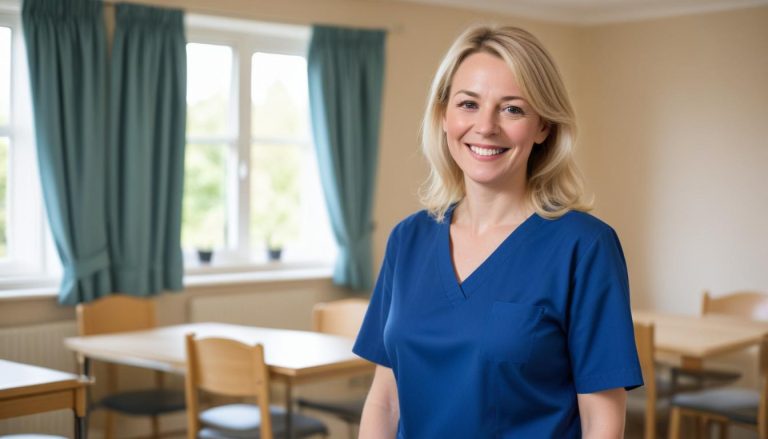
This guide will help you answer 1.1 Describe the purpose of team working.
Teamworking is an essential element in health and social care settings. It refers to a group of individuals collaborating to achieve common goals. In such environments, the primary aim is to deliver high-quality care that meets the needs of individuals. This cannot generally be achieved effectively by one person alone, which is why working as a team is so important.
Promotes High Standards of Care
One core purpose of team interaction is to ensure people receive the best care possible. In health and social care, tasks can range from administering medication to offering emotional support. These responsibilities require combined expertise and skills. By working together, team members can pool their knowledge and experiences to provide the most appropriate and consistent care.
Examples include:
- A nurse consulting with a social worker on how to support someone being discharged from hospital.
- A supervisor guiding a care worker on best practices when supporting an individual with dementia.
- Health professionals referring to other specialists to ensure holistic care.
No individual has all the answers or skills. Collaboration ensures no crucial detail is missed, helping to improve outcomes for those receiving care.
Encourages Sharing of Workload
Workload can often feel overwhelming in care settings. Teamworking distributes duties more evenly. This makes care delivery more manageable and prevents worker burnout.
When teams share tasks appropriately, it:
- Reduces stress for individual workers.
- Prevents mistakes caused by rushing or fatigue.
- Ensures ongoing care even if one team member is unavailable.
For example, if one worker is unable to complete a task, another can step in to assist. This kind of mutual support ensures continuous, uninterrupted care delivery.
Improves Communication
Effective teamworking involves good communication. In health and social care, information must often pass between different workers, departments, or agencies. Teamworking ensures that communication is clear, accurate, and timely.
This reduces misunderstandings and ensures everyone is informed of changes. For instance:
- A care worker might share updates about an individual’s progress during team meetings.
- Shift handovers ensure that vital details about an individual’s care are passed on clearly.
Clear communication prevents duplication of work, ensures actions are prioritised, and helps workers feel part of a cohesive unit.
Encourages Respect and Trust
Working closely within a team builds respect and trust among colleagues. Team members learn to appreciate each other’s skills and contributions. This creates a supportive environment where everyone feels valued.
Respect also fosters accountability. Team members are more likely to fulfil their responsibilities when they respect those around them. Trust-oriented teams encourage openness, meaning workers don’t hesitate to ask for help or admit mistakes.
For example:
- A care assistant feeling comfortable to admit they need guidance with equipment.
- Team members helping each other improve skills through training or peer learning.
By building trust, teams perform better and create a positive atmosphere that benefits both staff and the individuals they support.
Promotes Skill Development
Teamworking is an opportunity for workers to learn. Different team members often bring unique skills and knowledge to the group. By observing and interacting with colleagues, workers can expand their own abilities.
Examples of skill development through teamworking include:
- Learning new practical tasks from skilled colleagues, such as operating assistive technology.
- Adopting new approaches to communication through observation.
- Gaining insight into managing challenging behaviour by working alongside experienced professionals.
Teamworking helps individuals feel more confident in their role while also improving overall care standards.
Enhances Problem Solving
Teams are better equipped to handle challenges in health and social care. Together, they can explore solutions by combining their skills and expertise. A diverse team brings varied perspectives, which can lead to better ideas.
For instance:
- Devising a care plan for a complex condition is easier with input from several team members.
- Tackling workplace challenges, like staffing shortages, can prompt creative solutions.
Problem-solving as a team ensures that complex situations are managed effectively, ensuring high-quality care.
Encourages Emotional Support
Working in health and social care can be demanding. Workers often encounter stressful situations, emotional scenarios, or heavy workloads. Being part of a team means you can lean on others for emotional support.
Teamworking allows:
- Celebrating achievements together, boosting morale.
- Sharing difficult experiences, reducing feelings of isolation.
- Gaining encouragement from others during challenging days.
For example, after a difficult shift, a supportive team environment can help workers decompress and maintain resilience.
Fosters Consistency
Consistency is vital in health and social care. People receiving care feel safer and more supported when they experience predictable routines and approaches. Teamworking ensures consistency, as workers can communicate efficiently and align their approaches.
For example:
- Team members might agree on intervention methods to support an individual with challenging behaviours.
- Care workers may follow jointly created plans to uphold routine care procedures.
When a team operates consistently, individuals receiving support experience better outcomes with less confusion.
Improves Efficiency
Teamworking makes care delivery more efficient. When tasks are coordinated, time is used wisely, and duplication is avoided. Each team member can focus on their assigned role, knowing others are completing their duties too.
Improved efficiency benefits:
- Workers, who have better control over their workloads.
- People receiving care, as they experience faster and more effective support.
For instance, a care team preparing for a hospital discharge can allocate roles to ensure transport, medication, and home adjustments are all handled promptly.
Supports Organisational Goals
Care organisations often have specific goals, like improving outcomes or meeting regulatory standards. Teams working together can align their efforts to achieve these aims. Shared accountability also helps workers stay on track.
For example:
- A care team might focus on improving client satisfaction scores.
- A health organisation might target reduced waiting times through better collaboration.
Teamworking ensures care services remain consistent with organisational values and objectives.
Prepares for Emergencies
In emergencies, teamwork is critical. Health and social care settings must respond quickly to sudden issues, be it a medical crisis or safeguarding concern. A strong team can act immediately and effectively.
For example, if a person receiving care suddenly collapses, a well-functioning team can:
- Assign one worker to call for medical help.
- Delegate another worker to provide first aid.
- Ensure others remain calm and offer comfort.
Preparation through teamwork reduces response times and improves outcomes during emergencies.
Final Thoughts
To capture the benefits of teamworking more clearly, think of the following:
- Better care quality through shared skills and knowledge.
- Reduced workload pressure on individuals.
- Improved communication across the workplace.
- Increased respect and support among team members.
- Opportunities for learning and professional growth.
- More effective problem-solving through collaboration.
- Emotional support for dealing with challenges.
- Consistent, efficient, and effective care delivery.
Without good teamworking, care standards can drop, workers can feel isolated, and people receiving care may face unnecessary risks. Teamwork ensures that everybody – staff and service users – benefit from a structured, collective approach.
Subscribe to Newsletter
Get the latest news and updates from Care Learning and be first to know about our free courses when they launch.






